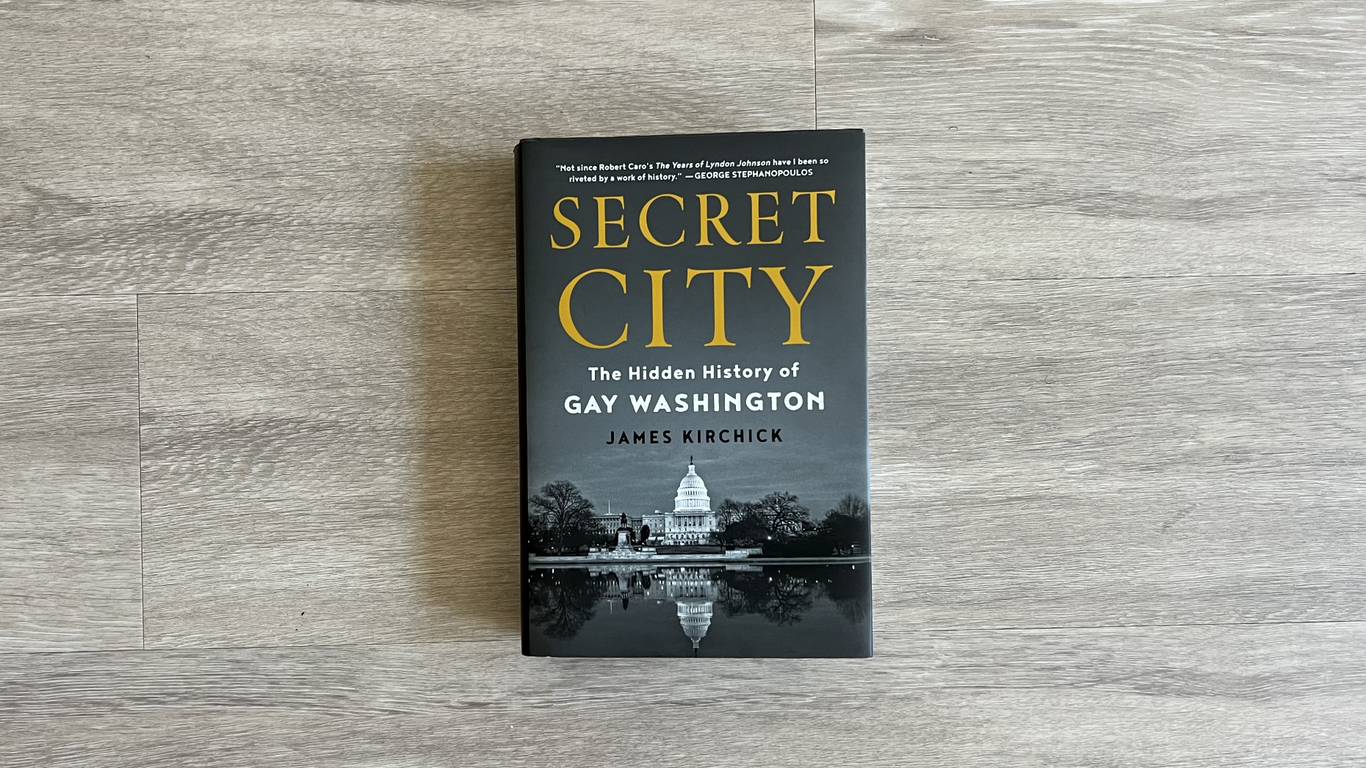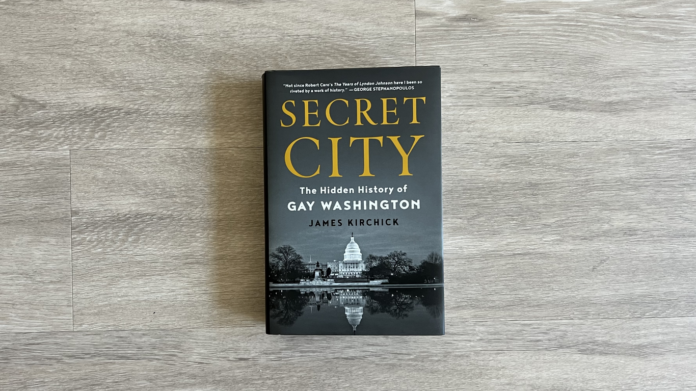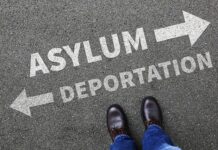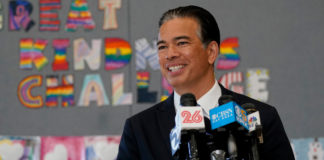
Author and journalist James Kirchick recently released D.C.’s latest must-read, “Secret City: The Hidden History of Gay Washington.”
Driving the news: The book highlights the many ways gay people served and shaped their country and national politics, all while hiding a major piece of their identity in order to maintain their careers.
Paige met with Kirchick at The Diner in Adams Morgan and chatted about Secret City over french fries. His responses have been edited for clarity and brevity.
Did you ever hesitate to write about some of these people who spent their whole lives trying to hide this aspect of their identity?
The book only outs two people, and they’re dead. My general belief on outing is when you’re dead, you belong to history.
One of the men is Ray Price, Richard Nixon’s chief speechwriter. Nixon knew he was gay. So, to hear what Nixon was saying about gay people, while simultaneously having a gay chief speechwriter, proves the kind of pattern that I write about in my book.
- You see these presidents, they have a gay friend or gay adviser, and yet they have public policies that are terrible. I think the public should know that.
The other man is Peter Hannaford, who was one of Ronald Reagan’s top advisers. He, alongside Michael Deaver, who became White House chief of staff, had a consulting firm that was basically running Reagan’s public image in between his being governor and president.
- They were ghostwriting his op-eds, they were arranging his travel and building him up to be president.
Ultimately, Hannaford does not end up working in the Reagan administration. I can’t prove that it was because he was gay. But we can infer that might have been the case.
The debate over how to teach American history has become heated recently. What are some of the themes from your book that you would like to see taught in schools?
We all learn about the Red Scare and McCarthyism. Not enough people know that there was a whole homophobic aspect to that as well: the Lavender Scare.
While there was a communist threat and there were a handful of communists in government jobs, there was no threat posed by gay people. It was totally a product of paranoia and fear. The Lavender Scare was just as destructive, if not more so, in terms of the lives lost and the careers destroyed.
- I think it’s important to learn about the patriotism of these people who wanted to work for a government that didn’t want them. It reminds me of Black soldiers in World War II fighting in a segregated unit. They genuinely believed in what they were doing, but they were still being discriminated against.
After years of research to highlight gay history, how did you react to the “Don’t Say Gay” bill in Florida and similar efforts?
I think it puts into perspective that the struggle for gay acceptance has always been a struggle against silence. One of the major lessons of the book is that when something is kept secret, and you’re not allowed to talk about it, and it’s pushed into the corner, then it’s very easy to develop ignorant and conspiratorial views about it. And when you’re ignorant to something, it can breed hatred.
So your book is all about D.C., which used to be known as Chocolate City. How does the Black gay community factor into this history?
It’s complicated, because the book is about political power, and Black people were almost entirely excluded from political power.
That doesn’t mean that there aren’t Black figures in the book. One of the most colorful figures was Odessa Madre. The Examiner’s review of Secret City describes her as part Al Capone, part Robin Hood. She was sort of this crime boss, but also a community leader. She was the most powerful Black woman in Washington.
Another major character I talked about is a personal hero of mine: Bayard Rustin, an openly gay man who organized the March on Washington. Two weeks before the March, in an effort to discredit the event, Strom Thurmond outed him on the Senate floor. Interestingly, civil rights leaders such as Martin Luther King Jr. stood by Rustin.
- It’s probably the first instance of a public figure being outed, and surviving the experience. Rustin went on to have a very successful career… which probably could have been more successful if he hadn’t been outed. But he survived it. That’s a pretty big moment.
And then in the ’70s, I write about the racism within the gay community, because there was a lot of it. A separate gay Black social scene developed, featuring private clubs, private associations, and Black gay bars.
D.C. now has a thriving gay community, how did that happen?
D.C.’s actually been quite gay since the New Deal. You had all these federal agencies developing and the size of the city was increasing.
Another milestone is in 1975. The Civil Service Commission — which is now the Office of Personnel Management — lifted the ban on gay people working in the civil service.
- Gay people had been banned from working in the government since 1953 by an executive order. D.C. is one of the first places to implement anti-gay anti-discrimination policies; other states and cities don’t do so until much later.
Suddenly, the largest employer in D.C., the federal government, allowed gay people to work and not be fired because of it, which is not the case for a lot of places.
What’s your favorite story in the book?
I think the story that I spent the most time telling is about Bob Waldron, a gay man who was an aide to President Lyndon B. Johnson. He worked for LBJ when he was a senator and when he was vice president.
- But three weeks into the new administration after the Kennedy assassination, Waldron had a background check to join the White House staff and they found out that he’s gay, which destroyed his career and life in politics.
Go deeper: Read an excerpt in Politico Magazine of Kirchick’s account of the effort to out Ronald Reagan.
What do you want people’s biggest takeaway from the book to be?
The perseverance of these people who served their country when their country didn’t want them is something I think is really important to acknowledge. Our country was denied a massive amount of talent, and it was a massive waste of energy and resources to investigate patriotic citizens because of who they loved. Our institutions are not well served when we don’t look at and appreciate people as individuals.
Sometimes when I’m reporting on heavy topics it can feel draining. Did you ever get that feeling during the book-writing process?
There were absolutely moments when my heart sank. But with this book, I think I came away mostly just with a sense of gratitude at the amazing progress that’s been made. If you look at the status of gay people in this country when the book begins in the 1930s, these people’s very existence was criminal.
- Across the U.S., homosexuality was illegal. It was condemned by organized religion, and deemed a mental disorder by the medical establishment.
I think it’s an incredible journey. I feel gratitude. This is the best time to be gay in America. That’s not to say that people don’t struggle … of course, they do. But there’s never been a better time than today.
📚 Buy Secret City: The Hidden History of Gay Washington here.







